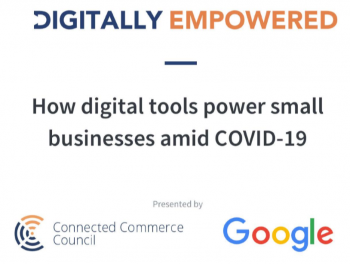
Retailers and non-traditional service providers are using online marketing in ways they likely would not have prior to the pandemic, and such efforts look to be here to stay. In fact, it could be the saving grace for many small businesses during the pandemic.
A report released today by the Connected Commerce Council (3C), in partnership with Google and conducted by LRWGreenberg, finds small businesses are optimistic about reopening their businesses, empowered and fortified by digital tools and services, and resilient in the face of the COVID-19 crisis.
The report entitled “Digitally Empowered: How Digital Tools Power Small Businesses Amid COVID-19” found that during the COVID crisis 76% of small businesses are relying more on digital tools than before, and 74% of small businesses expect to be back to business as usual within six months of restrictions being lifted.
Additionally, nearly one-third of businesses surveyed said that without digital tools they would have had to close all or part of their business during the COVID crisis.
“This report shows that in the face of the COVID-19 global pandemic and economic crisis, digitally empowered small businesses are weathering the storm and optimistic about the future,” said Jake Ward, President of 3C, a non-profit membership organization representing digitally empowered small businesses. “Access to affordable, scalable, and secure tools is critical — now, more than ever. Small businesses drive the American economy, and they will drive the American recovery with the support of their communities and digital tools.”
The early data shows that digitally empowered small businesses were able to adapt and in some cases thrive through the use of digital tools as physical brick and mortar shops were shut down during the pandemic.
Digital tools are categorized as enterprise-quality tools servicing small businesses. They include, among others, marketing and advertising tools like Instagram, YouTube, Google Ads and analytics; customer relationship management tools from Salesforce and Constant Contact; operations platforms from Quickbooks and Hubspot; and online marketplaces like Amazon, Shopify, and eBay.
While state specific data is not yet available, the group is working to roll out additional reporting throughout the summer to address how businesses in the various states have reacted during this time, including perhaps the impact of the availability, or lack thereof, in states like Mississippi.
The report also found that:
- Small businesses without a pre-existing e-commerce presence were twice as likely (31% vs. 15%) to have temporarily stopped operating during the crisis.
- Small businesses that were using e-commerce tools pre-crisis are 5.5x (11% vs. 2%) more likely to project increased revenue in 2020 compared to 2019.
- Women small business owners are substantially more likely to use digital tools than men, particularly social media (43% vs. 29%).
- Over 80% of small business owners are interested in learning more about how digital tools can help their business in the future.
Digitally Empowered is based on a survey of 502 U.S. small business owners conducted by LRWGreenberg. The survey was fielded online from May 6 to May 18, 2020, among a nationally representative sample of 502 US small business owners in the following census-aligned verticals: Professional, Scientific, and Technical Services, Educational Services, Accommodation, and Food Services, Other Services (other than Public Administration), Retail Trade, Wholesale Trade, and Arts, Entertainment, and Recreation. Data were weighted to align with the known distribution of US small business owners in terms of business size, owner gender, race, and ethnicity, and region.
The full report can be read here courtesy of the Connected Commerce Council.











